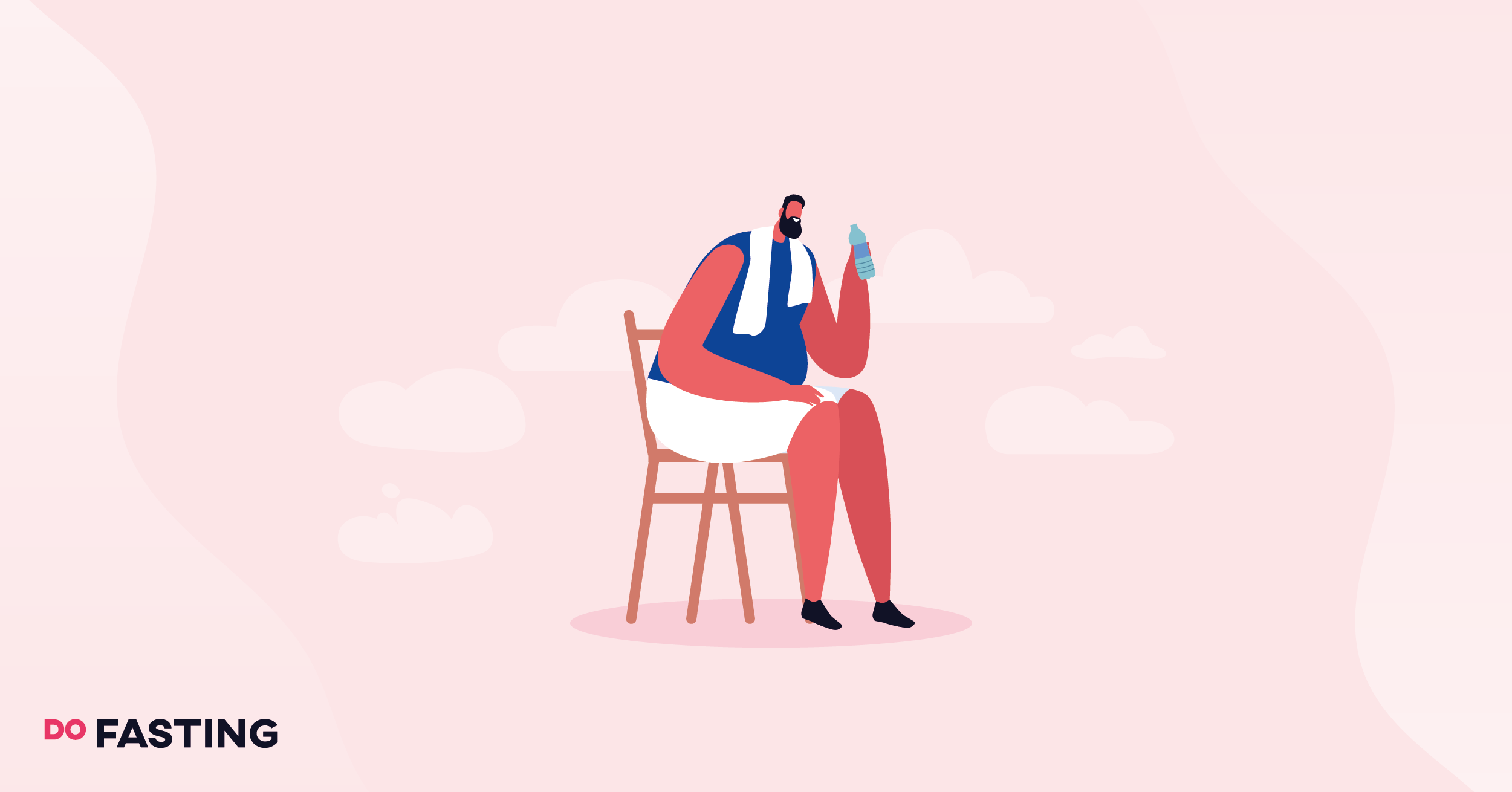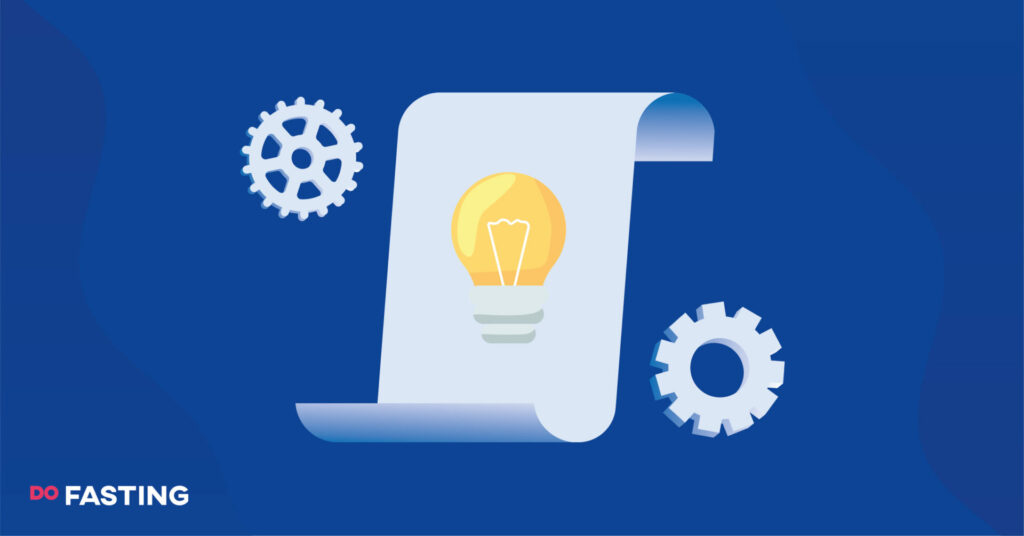Contents
What Is Prolonged Fasting?
For anyone familiar with intermittent fasting, the idea of prolonged fasting is essentially IF dialed to the extreme. Extended fasting has been around for a long time, whether as diet trends or as spiritual practices, and there is plenty of scientific proof for the benefits of extended fasting.
So, let’s discuss the medical advantages of intermittent fasting, and in particular, going for an extended period without food.
When the human body is faced with a calorie deficit, the body’s natural reaction is to turn inside the metabolic system to find fuel. And if you continue to deprive your body of sugar and high-carb foods, then it must target fat stores for energy.
This is what is known as flipping the metabolic switch, as you go from a system that burns glycogen or blood sugar and begins to burn stored body fat.
This metabolic switch into “ketosis”, or the stage when your liver begins producing special ketones to target body fat even further, can certainly happen after 12 hours of fasting. But it’s during an extended fast that the most results are seen.
In essence, an extended fast is when you go for over 36 hours without food, while maintaining a calorie deficit.
A scientific study showed the fantastic benefits of fasting for long periods when a group of individuals participated in long-term fasting between 4 and 21 days, with low carbohydrate intake and zero-calorie diets.
Not only did these participants fast for more than 36 or even 72 hours, but they also experienced significant weight loss, and most reported improvement to symptoms of pre-existing conditions they suffered from.
The science is indeed intriguing, and prolonged fasting can certainly be the right choice for your weight loss and well-being journey, if you do it right.
That being said, it’s only recommended to do an extended fast once or twice a month, as too often can strain your body and have adverse effects, instead.
Take a
1-minute quiz
and discover how much weight you can lose with DoFasting!

4 Main Health Benefits of Prolonged Fasting
When extended fasting, your physical health not only benefits from weight loss, but there are several associated advantages, too.
For example, cardiovascular, molecular, and mental processes are all heightened as a result of intermittent fasting, along with other benefits that we will discuss briefly here.
-
Weight Loss
If you want to lose weight, burn fat, and keep it off, then fasting is a great choice. Because of the metabolic switch to ketosis that happens during a calorie deficit, not only will water weight drop away, but you will also start burning fat during extended fasting times. It’s really as simple as that!
-
Autophagy
Autophagy in fasting is one of the stages that your body enters after the metabolism switches to ketosis. During autophagy, the cellular system has the opportunity to repair itself on a molecular level, successfully purging toxins and harmful substances from every part of the body.
-
Lower Insulin Levels
By lowering your insulin levels, extended fasting reduces the risk of heart disease or cardiovascular issues. Plus, by easing metabolic stress and promoting low blood pressure, strokes and other inflammation-based illnesses are also less common for fasters.
-
Improved Cognitive Function
The mental health benefits of fasting are likely not the first thing on your mind, but you can also expect significant health improvement for your brain, too. Not only is fasting good for improving cognitive functions, but it has also been known to lessen symptoms of depression, anxiety, and more.
This is because your neurological pathways have time to repair themselves and rejuvenate during the autophagy phase, and your brain is able to tap into a purer form of energy from burning fat instead of glycogen, leading to more clarity.
10 Tips on How To Get Started on Prolonged Fasting
Intermittent fasting is not for everyone, but if you are dedicated to a lifestyle change for the better and all the benefits of extended fasting, then we have compiled some of the best extended fasting tips on how you can be successful when beginning the journey of prolonged fasting.
-
Avoid Sugar and Refined Carbs Before Fasting
The eating pattern you follow in the one or two days preceding an extended fast can have a significant impact on the fasting process itself. Because you are essentially pre-fueling yourself for the process of calorie restriction, the foods you consume prior to fasting will alter how well your metabolism functions during it.
For example, avoid eating sugar and foods that are high in refined carbohydrates in the days leading up to a fast. These foods turn to glucose when consumed, and if your body is used to burning sugar immediately before a calorie deficit, it can reduce the effectiveness of the fast.
-
Fuel Your Body With Healthy Fats and Protein
As you transition into an extended fasting window, it’s important to plan your dietary fat intake, amount of protein, and fiber levels to give you the best possible start to the restriction and prepare your metabolism for optimal function.
Instead of eating processed foods for the last meal before prolonged fasting, opt for elements of the ketogenic diet as a balanced selection of foods.
Eat healthy fats like olive oil, whole-grain foods, lean protein like chicken, and plenty of fiber-rich vegetables. This will set you up for success in your extended fast!
-
Have a Fasting Partner
Most things are easier with friends, and weight loss is no different. Because prolonged fasting requires a great deal of determination and dedication, having a fasting partner can really give you the support you need.
Fasting with a partner makes you accountable while fostering some healthy competition to keep you on track to finish the process without quitting. Try checking out some intermittent fasting support groups or Facebook pages to find a buddy!
-
Get an App to Track Your Fast
Keeping track of calories, fasting windows, and exercise levels manually can be frustrating and easy to forget. That’s why we recommend the DoFasting app that takes the effort out of tracking your fasting progress.
Remove the guesswork from extended fasting with an app that lets you know what stage you enter, how much water to drink, and how long is left in your fast to keep you motivated for success!
Take a
1-minute quiz
and discover how much weight you can lose with DoFasting!

-
Increase Fasting Window Slowly
As with other things in life, easing in slowly is sometimes better than jumping right in. Instead of starting with an extended fast, begin by implementing shorter fasting windows into your schedule to get your body used to it.
For instance, you could start with alternate-day fasting, and progress up through 12:12, 16:8, 24-hour fasts, and further. It’s important to be completely comfortable with the process before pushing your limits into prolonged fasting!
-
Avoid Intensive Exercises
Though you might be worried about extended fasts causing muscle loss, it is not a good time to do high-intensity exercise. Fasting for a long time might make some muscle mass diminish, but that’s only because as body weight drops, some of that mass is unavoidably from the muscles.
Instead, opt for light-intensity exercises that won’t strain your body or burn enough calories to make your body think that it’s going into starvation mode and hold onto fat stores for later.
Try walking, yoga, swimming, and stretching to avoid feeling too sedentary or experiencing muscle pain if you are typically active. Plus, it will make you feel energized and take your mind off being hungry!
-
Increase Your Water Intake During Fasting
While this type of longer periodic fasting is not a form of strict water fasting, it’s still important to increase the level of fluids you drink during the time spent during calorie restriction— particularly water.
It’s important for the human body to stay hydrated in any diet or throughout any eating habits in general, but hydration is even more essential during long periods of fasting. You are also allowed certain zero-calorie beverages and electrolytes to help supplement yourself.
For instance, black coffee, green tea, and even a cup of bone broth are all acceptable things to drink during extended periods of intermittent fasting.
Because they are under the 50 calorie threshold and do not contain enough sugar or carbohydrates to push the body out of ketosis, you can safely drink such beverages during prolonged fasting.
And when it comes to daily water consumption, medical advice typically recommends drinking between 3.7 liters for men and 2.7 liters for women. But you should try to drink a bit more during an extended fast period, as the typical foods that humans get a percentage of their daily fluids from being removed from your diet.
Plus, drinking water can help you avoid feeling hungry during long periods without food, as it helps fill your stomach up and tricks the brain into thinking you are actually satisfied. Which makes it much easier to last the long period until your next eating window, so drink plenty of water!
-
Take Electrolytes During the Extended Fasting Window
Electrolytes are essential minerals for staying hydrated, regulating the body’s pH levels, and sending the right hormones to your muscles. As such, it’s important to keep electrolytes in your diet, especially when intermittent fasting for a while.
Because the natural sources of electrolytes are removed during fasting, such as fruits and vegetables, you should supplement calorie-free electrolytes to keep yourself feeling energized and well— including potassium, magnesium, and sodium.
-
Take Fasting Friendly Supplements
Similar to electrolytes not being as prevalent in your natural diet during fasting, it’s important to take the right vitamins and mineral supplements to keep yourself healthy.
One of the best is the DoFasting Essential Fiber Complex Supplement, with natural cellulose and glucomannan, it also functions as an appetite suppressant and helps you feel fuller for longer, which is perfect for anyone who is fasting!
-
Accept the Hunger Pangs
It should come as no surprise that long-term fasting will come with associated hunger. After all, you are embarking on a calorie restriction plan that lasts for quite a long time. As such, feeling hungry and dealing with hunger pangs is part of the process.
Though you can mitigate some of the hunger severity by staying hydrated, taking the right supplements, and trying to keep your mind off of it, there comes a point when you are just plain hungry during the first and second fasting days.
However, this doesn’t last forever— in fact, some of the hunger you might feel could be purely mental and remnants of former, repeated cycles, where emotional eating or picking up a snack because you are bored have become your normal eating pattern.
For many people who practice extensive fasting length periods and time-restricted eating, the feeling of hunger will fade away around the day 2 mark.
This happens as the body’s hormones regulate fully and produce more satiating chemicals like leptin, instead of the ghrelin hormone that makes you feel like snacking.
How to Safely Break Prolonged Fasting?
Once you have finished with your extended fast— congratulations! Now, it’s time to introduce the right foods back into your eating window and at the right speed.
While what you don’t eat during fasting is key, what exactly you do eat becomes absolutely crucial as soon as the restriction period is over. So, read on for the best foods to safely break your extended fast and prevent feeling sick.
Opt for small portions of easily digestible foods, like protein-rich soups, bone broth, steamed vegetables with salt, or smoothies. You could also drink vegetable juices to reintroduce nutrients gently, but avoid vegetable juice from high-fiber plants as it could upset your stomach.
Unsweetened yogurt, kefir, eggs, sardines, and avocados are also great to get some protein and healthy fats into your system, as well as dried fruits and starchy vegetables to provide some good sugars and carbs that won’t raise your glucose levels dangerously.
And importantly, to avoid weight gain, don’t overcompensate for the lost calories during your previous fast. It could be tempting to eat everything you’ve been craving for the past few days, but it will just make you ill and possibly regress in your weight loss progress.
Who Should Not Do Prolonged Fasting?
Extended fasting can be a real advantage for many people trying to achieve weight loss or simply gain some mental health benefits such as mental clarity or other associated pros, like lower blood sugar. That being said, this method is not ideal for all people to try safely.
Some individuals should not try extended fasting or other fasting methods without first getting medical advice or under medical supervision. This includes persons who identify with any of the following conditions:
- A history of an eating disorder.
- Breastfeeding, pregnant, or trying to conceive.
- Chronic pain sufferers.
- Diabetes or those with irregular blood glucose levels.
- Immune system deficiencies.
- Insomnia or trouble sleeping.
- Pre-existing health conditions.
- Suffering from heart disease or blood pressure issues.
- Taking certain prescription medications.
- Under the age of 18 years old.
Conclusion
In all, extended fasts are known for weight loss, health improvement, and bettering your well-being.
And though the process of prolonged fasting can be difficult, it can help you break free from unhealthy eating habits and reap the benefits, including better mental cognition, regulated insulin levels, and of course, promoting weight loss.
It might seem daunting, but an extended fast for over 36 hours makes sense, thanks to putting your body into ketosis for ultimate fat-burning potential. And through some key extended fasting tips and tricks outlined here, you too can experience the benefits of a prolonged fast!
Take a
1-minute quiz
and discover how much weight you can lose with DoFasting!

See how DoFasting will improve your life
Find out what works for you with this 60-sec quiz approved by our experts and get your personal revolutionary fasting assistant.
Start the Quiz
This is an evidence-based article that includes scientific citations. DoFasting’s professional writers and editors prepared the content, which a team of medical experts verified to be accurate.















